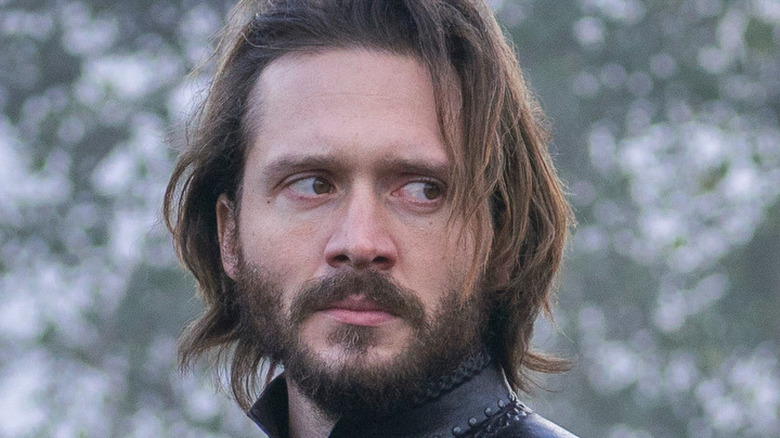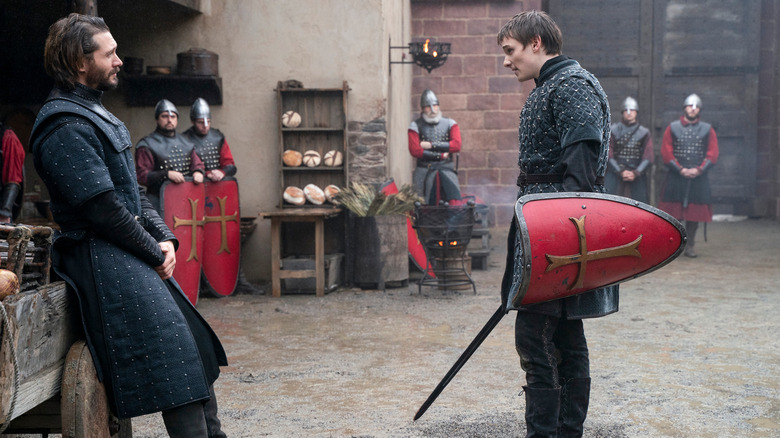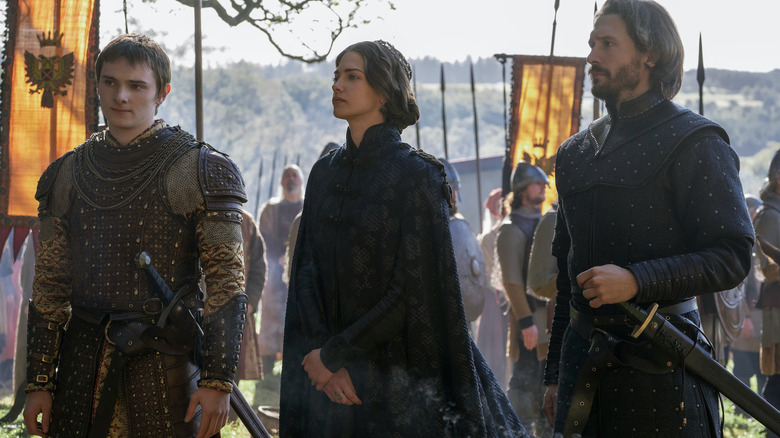Vikings: Valhalla's David Oakes Reflects On The Intrigue And Expectations Of Earl Godwin - Exclusive Interview
The show may be called "Vikings: Valhalla," but it includes plenty of castle intrigue revolving around the English throne. At the center of it all is Earl Godwin. While he begins the series as the King of England's closest advisor when the prince, Edmund (Louis Davison), inherits the throne, it quickly becomes clear that Godwin can play politics with the best of them.
Bringing the character to life is David Oakes, a veteran of historical dramas such as "The Borgias," "The White Queen," and "Victoria." He brings layers of cunning and intelligence to Godwin, a man whose ambition is driven by a dicey family background and a desire to be on the winning side of history. And in the Netflix spinoff of "Vikings," his Godwin becomes an increasingly important player as he maneuvers and manipulates in response to the change taking place around him.
In an exclusive conversation with Looper, Oakes reflected on his character's relationship with Edmund and how the constant comparisons others make between Godwin and his disgraced father motivate his actions in "Vikings: Valhalla."
Advising a young ruler
You play an English character whose job in the early episodes centers on reining in a very young king. How did you conceive of your relationship with Edmund as a prince and then as a king?
I've always seen it as an avuncular relationship. I see him as an advisor who can suggest opportunities that may not necessarily be taken up on [Edmund's] part. It's trying to guide him in the right way, to bump him into becoming the man that he could possibly become. Whether or not he becomes that is down to him.
That's what's very lovely about how that relationship develops across the series. Not necessarily in the direction you might expect, but it is: "What are the best ways to teach this young man a lesson? A man who has grown up with everything in a court where he was provided with all the world's luxuries, how do you teach that man to have humility and caution and patience?" Which, if you're facing down an army full of Vikings, they're probably pretty useful things to have.
Your character is the only one who's willing put Edmund in his place. Godwin's managed to get to a certain level in the court that makes him feel comfortable doing that. How did you understand his position to be able to keep his real motivations close to the vest but still be able to say what he wanted to people in power?
From a character perspective, [Edmund and Godwin have] gone on a journey together. They've gone up to Mercia, they've achieved, they've listened to each other, they've spent a significant amount of time together to such an extent where a certain amount of trust has been manifested. I don't think he would be that frank with a young Viking king, for example, but there was a trust there.
I also think that Edmund is lost. He's just lost his father, his stepmother is semi-ruling in his father's place; he needs anyone to be there for him to give him advice. Sadly for Edmund, he doesn't necessarily hear all the advice that he's given and that ultimately leads to his downfall. The interesting thing is that in Episode 5, Godwin is still prepared to try and rescue him, try and get him out of it, because he has a sense of loyalty to him. That might sound strange to some people as the series develops, but there is a certain moral framework to what [Godwin] does.
Rising above an unfortunate family history
Other characters mention Godwin's father a lot. Godwin became the King's closest advisor even though his father wasn't favored by the monarchy. Did your knowledge of Godwin's family history impact the way you conceived of the character?
Yeah. There's very little we know about Godwin's father in real life. There's also very little we know about Godwin in historical records. There's lots of mentions of him at various interesting points, but we don't quite know how he gets from point A to B to C. What we do know a lot about is where his family history goes from that point on with his son and daughter. So, that's fascinating.
By ["Vikings: Valhalla" creator] Jeb [Stuart] writing in this huge amount of correction that needs to occur to repay the debt is an amazing motivator for character arch, which is great. Also, for almost every single character, to treat him like he's useless and worthless because his father was is a really good place, narratively speaking, to start from because it means that no one's expecting anything of Godwin, that will be the mistake of a lot of people in this show.
This interview has been edited for clarity.
The eight-episode first season of "Vikings: Valhalla" premieres on Friday, February 25 on Netflix.


